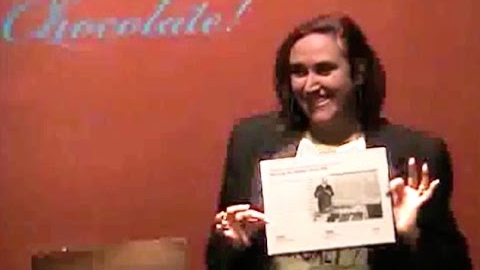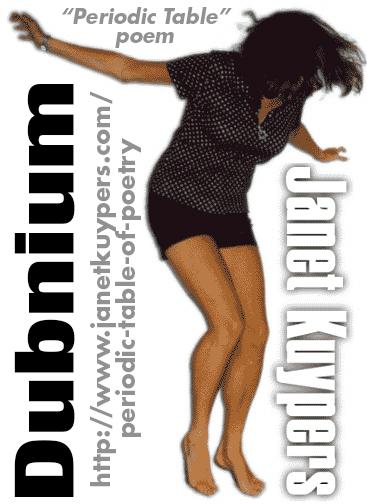Zinc
Janet Kuypers
from the “ Periodic Table of Poetry” series
After my injectable medication prescription started,
I learned that the drug I had to take
would suppress my immune system,
which meant I’d have to start getting flu shots,
dress for the weather because it’s easier
to get a cold or a fever,
and get more religious
about taking more vitamins and minerals.
Time to o.d. on vitamin C.
Take some D when the sun’s not out.
Get your daily B, E, iron, calcium, and Zinc.
It’s funny, I see Zinc throat lozenges
for when people get sick
to try to speed their recovery,
but I figured I should hedge my bets
and take the supplements every day.
When I told my sister I started taking Zinc
after the injectable medication regimen began,
she was stunned. “You can take that much?
I can’t take that much Zinc like that daily.”
But the thing is, Zinc is in nearly one hundred
enzymes needed for plant and animal life.
So whether or not you think the idea
of eating this metal is good for you or not,
it’s apparently needed, and if it’ll help me stay healthy
I’ll make a point to somehow consume my share.
Besides, when cold season comes annually
I see more and more advertisements
for zinc lozenges and over the counter medications,
because zinc will help stop any infections
so that people can get on with their lives again.
I mean, two billion people in developed countries
actually even have Zinc deficiency,
which could cause growth retardation,
delayed sexual maturity, regular diarrhea,
or the one I have to fear: infection susceptibility.
So I just have to keep in mind
the ways that Zinc is needed in the body…
Being the forth most common element
(behind iron, aluminum and copper),
it’s easy to want to consume Zinc
because you think it’s entirely for your own good.
But even though Zinc as an element
is hard and brittle,
too much Zinc can actaully
sap the copper from our bodies
(because we apparently need
a lot of metal elements in our body
to keep us strong and make us work right).
And the way too much Zinc
can sap the copper from our bodies,
soil with too much Zinc from local mining
could mean that plants (which need metals
to live, and we need those plants for food)
won’t be able to absorb the other metals they need.
And since it was discovered in the seventeen hundreds,
alchemists used to burn zinc from the air,
to get what they called “white snow,”
or “philosopher’s wool,” because it collected in puffs.
Hmmm. Philosopher’s Wool.
Not half bad sounding.
Maybe I can wax philosophic
about how Zinc — this philosopher’s wool —
can protect my immune system,
and help me grapple with the
philosophical questions of life.
But really, after the Germans discovered
Zinc in the seventeen hundreds, they started
using it as a plating of steel,
and we have later found
that Zinc is a great anti-corrosive agent,
because it’s more reactive
than iron or steel.
Zinc was used throughout history also in brass,
but thinking of those nearly one hundred enzymes
used for plant and animal life that use Zinc,
it made me think of all of the compounds
and ions Zinc is now used for:
Zinc gluconate is that dietary supplement,
Zinc chloride is added to lumber as a fire retardant,
Zinc sulfide is even used in luminescent paints,
and hey, let’s make this a little more personal
for us humans here,
Zinc pyrithione is used for anti-dandruff shampoo,
and Zinc chlorinate is used in deodorants…
So yeah, from what I’ve learned
Zinc is needed in so many ways,
on so many levels, for both us animals
and the plants we need to live our lives.
It’s strange to think that one element like Zinc
can be used for many different purposes
(like stopping metals from corroding
or stopping wood from catching fire)…
But we also have to keep in mind
that Zinc, in nearly one hundred enzymes
needed for our plant and animal life,
proves that we need Zinc within us
as well as around what we need.
I don’t know, I’m just glad
that my stomach doesn’t react badly
to taking Zinc supplements daily,
because since I want to make sure
I’m as healthy as I can be
for as long as I can be,
taking more of a metallic element like Zinc
than the average person does
really is a small price to pay.




